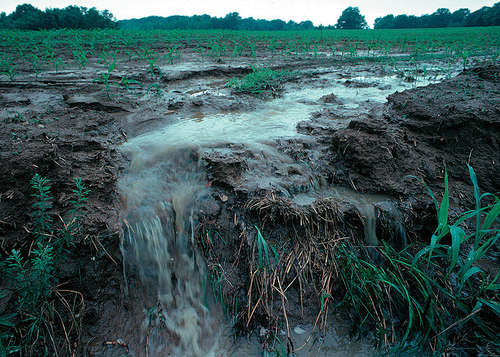Ag Certainty = uncertainty for water quality

While all other sectors of our economy cities, wastewater treatment plants, and factories have made dramatic improvements in water quality performance, agriculture has not. Runoff from farms and other agricultural sources remain the largest source of pollution to the Mississippi River.
Photo: USDA
On January 17th, Gov. Mark Dayton, along with U.S. Secretary of Agriculture Tom Vilsack and EPA Administrator Lisa Jackson, singed a memorandum of understanding for the development of the so-called Ag Certainty Framework or Minnesota Agricultural Water Quality Certification Program.
Under the joint federal-state proposal, large farm operators who voluntarily adopt some clean water practices would be granted an exemption from any further Clean Water Act requirements for a decade or more.
At this point, all that is certain about this program is that most successful and effective environmental protections, such as the Clean Water Act, are not going to be applied to the biggest source of water pollution in Minnesota: large agribusiness producers.
Ag still unaccountable
Since the Clean Water Acts passage in 1972, the agricultural sector has been exempt from programs that require measurable and enforceable reductions in water pollution. While all other sectors of our economy cities, wastewater treatment plants, and factories have made dramatic improvements in water quality performance, agriculture has not. Agriculture is the largest source of pollution to the Mississippi River.
Coming less than a week after the Minnesota Pollution Control Agency announced a list of 511 new impaired waters lakes, rivers and other bodies of water that do not meet their designated uses because of water quality standard violations the so-called Ag Certainty program simply isnt a serious approach to reducing agricultural runoff. Rather than hold the largest farm operators accountable for meeting water quality standards, Ag Certainty relies on exclusively voluntary measures. This approach has already consistently failed to achieve meaningful water quality improvement.
The program applies a one-size-fits-all approach to measuring agribusiness performance that isnt tailored to local water quality needs and is incompatible with Minnesotas varied landscape. Furthermore, the program fails to go beyond the same suite of existing conservation practices, many of which were developed without regard to meeting water quality standards.
While FMR supports clean water incentives for farmers, exchanging a ten-year exemption from the Clean Water Act for an unverifiable promise to install many of the same conservation practices that have been around for decades is not a viable path to achieving Minnesotas clean water goals.
Improving Certainty
If the Certainty Framework concept is to advance in Minnesota, FMR and our partners strongly believe it must meet the following core principles:
- Ensure water quality will meet standards.
Any agricultural water quality certification plan must be designed and implemented to ensure that waters meet state water quality standards. Conservation plans must be tailored to meet local water quality goals and evaluated by an independent examination team.
- Be targeted to the greatest needs.
Rather than prioritize funding for individuals who want to spend it, funding should be invested in the projects that maximize the pollution-reduction-per-dollar value for taxpayers.
- Ensure accountability from farm operators.
There must be mechanisms in place to ensure farm management plans are in compliance with water quality standards, and are reviewed on a periodic basis to ensure accountability. Operations not currently in compliance with existing law must not be eligible to participate.
- Feature a consistent certification period.
Currently, factories and cities implementing water quality improvement plans must meet safe water quality standards through five-year agreements. Any voluntary certification for large farm operators should follow the same timeframe.
- Be transparent and unbiased.
The development of the program should involve a robust cross-section of farm and rural groups, agencies, conservation and environmental organizations, including those with an agricultural working lands perspective, deeply rooted in conservation.
FMR has been in consultation with large farm groups, sustainable agriculture organizations and the League of Minnesota Cities all of whom have very serious objections to this proposed program. We have also expressed our concerns in detail to the State agencies charged with developing this program. We will continue to stay engaged in this dialogue while continuing our advocacy for honest and comprehensive approaches to addressing the problem of agricultural pollution. Stay tuned.
For another take on this issue read Don Shelbys recent column in MinnPost on the Minnesota Agricultural Water Quality Certification Program.